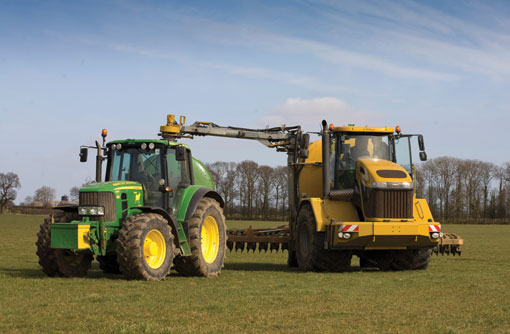Diversification proves its worth in tough year

The AWSM team is planning a year of consolidation after a disappointing harvest and a more than challenging autumn. Harvest 2012 saw wheat yields down by 30% compared with budget, barley down 15% and oilseed rape down by 10%. Unlike on many other farms, specific weights held up well at 72-74kg/hl.
However, the outcome of a recent cashflow and budget meeting to review the current year (ending 31 March) and consider prospects for the next gave some reassurance.
“While we were badly hit on the crop yields, the contracting income is up and some costs are down,” says Mr Metcalfe. Contracting income was higher because more work was done and there were some sundry costs such as wrap and string falling.
“As soon as we started harvest we realised how bad it was going to be and made a big effort to rein back and keep costs down.
“For example, where we might normally have subcontracted work out or hired in extra machinery, we took the decision not to do this to try and keep a lid on costs.”
Income has been further diversified by storing 2,800t of oilseed rape for Frontier, which required TASCC approval for the new grain store. This enterprise is being managed by new recruit Louis Smith whose main role is as environmental manager, dealing with permits and licences for the waste business.
Typical of the position on many farms, just 63% of the planned winter wheat area is in. “We’ve drilled all the good land, which is most of the contract farmed land. What’s left is mainly our own and our rented land and much of that is wet and heavy; there just hasn’t been the opportunity to do it,” says Mr Metcalfe.
Lamb sales
- 1,490 lambs have been sold so far, averaging £73.18 a head, with 400 left to sell.
- In addition, 167 pet lambs, mainly third lambs of triplets, were reared and sold for £68.14 a head, leaving a margin of £10.89 a head.
- These were reared indoors at a cost of £57.25 a lamb, comprising:
Milk (11.98kg/lamb) £21.56
Creep feed(61.68kg/lamb) £16.53
Labour £14.37
Vet & med £0.60
Straw £1.20
Sundries £2.99 - “The pet lambs have made a small amount but there have been other benefits – the shepherd wasn’t tied up with them during lambing and hopefully our need for replacements will be lower as the ewes with triplets were not trying to feed three lambs,” says Adam Metcalfe.
He has sold only 203t of the crop for harvest 2013, at £162/t ex-farm a few weeks ago. Despite the recent rapid rise in the wheat market, he is sticking at this tonnage for now.
“Everyone is very nervous of selling just now – we can usually bank on 3.5t/acre and would keep on selling at that – most of our crops look OK but there’s the odd field that doesn’t look so great. I don’t think we’ll sell much till spring.
“Our agronomist would rather we drilled wheat in January/February in good conditions than paddle it in now. If all else fails we have 250t of spring barley, which we’ve kept separate, so we could dress and drill that.
“If it does get too late for winter crops, spring beans are an option but then I’d be concerned about the late harvest and then a late first wheat again. Peas are more of a risk but would give us an earlier entry.”
Mr Metcalfe had sold about 80% of his expected 2012 wheat crop forward so the drop in yield meant that he had to buy out of part of his contracts with Frontier and GrainCo – an expensive exercise.
Fodder beet sales provide extra income alongside hay and straw sales but yields will be significantly down this year, says Mr Metcalfe. “But prices will be up because there’s no stock feed potatoes about.”
With so much undrilled land about, finding acreage for slurry spreading has been less of a problem than usual. In this department, Mr Metcalfe is expecting a change over the next few years, with less food waste and slurry handled as this material moves increasingly to become feedstock for anaerobic digesters and in turn the business takes on digestate spreading.
Grant success for rainwater harvesting
A rainwater harvesting system will be installed on the new grain store by late spring next year, potentially saving the business £3,000 a year in water costs.
A 30% grant has been approved through the RDPE Farming and Forestry Improvement Scheme for the £32,623 system. Water will be collected from about 3,750sq m of roof space, with underground pipes feeding a 100,000-litre, below-ground plastic tank.
From an average rainfall of 700ml, with 90% collection and filter efficiency, the expected rainwater harvest is 2.625m litres a year. The farm currently pays £1.14/cu m for water, hence the £3,000 a year saving.
An additional benefit will be an increase in pressure – the farm supply comes uphill from a mains about half a mile away and is shared with several houses – low pressure is an issue for all users.
Machinery investment plans for next year are more modest than for the past several years – a round baler and a telehandler will be replaced with new machines.
The business is also looking for a full-time sprayer operator, PA1 and PA2 qualified, with Mr Metcalfe and manager Andrew Yarrow currently sharing this role with the two other qualified staff.
The business buys 480,000 litres of fuel a year, representing the biggest variable input, so sourcing it as cheaply as possible is a priority. With the fuel business in the area contracting into very few hands over recent years, Mr Metcalfe has joined the Lincolnshire-based Woldmarsh buying group.
“I wanted to have more options and flexibility in fuel buying – it’s not just about the price but payment terms too.”
Read more on our Management Matters farms
